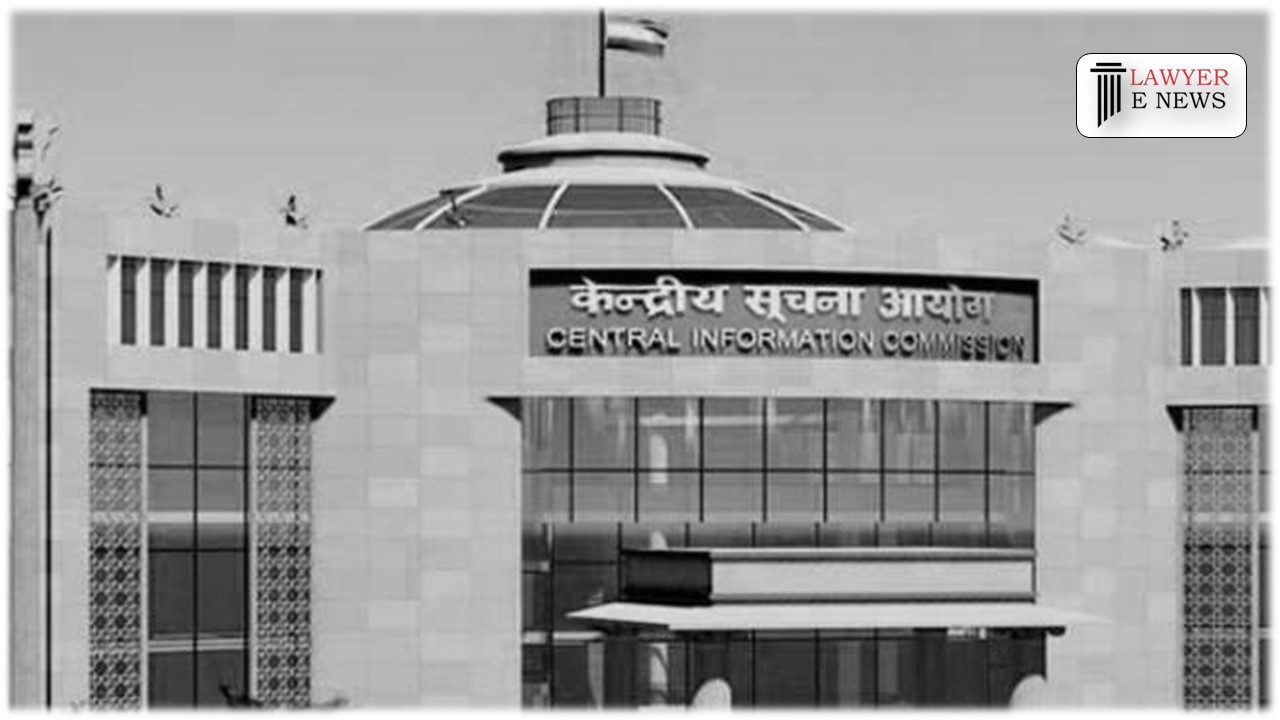-
by Admin
16 February 2026 1:47 PM



The Central Information Commission (CIC) has ordered the Bar Council of India (BCI) to publish inspection reports of law colleges on its website.
In an order issued on May 25, CIC Saroj Punhani stated that the disclosure of law school inspection reports to the public will benefit the entire student population and significantly reduce the number of RTI requests filed in this regard.
"For the aforementioned reasons, the Commission directs the FAA to present this order to their competent authority in order to expedite the upgrade of the BCI website and incorporate the Commission's stipulations in the H N Pathak case," the CIC stated.
It was hearing an appeal against a decision of the First Appellate Authority (FAA), which had denied the petition to provide details of law schools that were deemed unfit or had their affiliation revoked following a BCI inspection.
In its order, the CIC also vehemently objected to the FAA's "disdainful conduct" and frenetic arguments with the appellant during the hearing before it.
"The FAA launched into a frenzy of argumentation with the Appellant for bringing up allegations of a lack of transparency and for insisting on noncompliance with earlier Commission directives. "The Commission took exception to the FAA's disrespectful behaviour and closed the hearing," the order stated.
As background, on March 16, 2020, fourth-year law student Prasoon Shekhar filed a Right to Information (RTI) application inquiring about the frequency with which BCI inspected colleges.
The Central Public Information Officer (CPIO) provided point-by-point information to the appellant on July 24, 2020. Regarding the inspection of law schools, the information stated, "All applications for approval will be considered only after inspection. If the college meets all requirements, an inspection will be conducted. Priority will be given to the new law school applications first. As part of the inspection of new law schools, the colleges located nearby will also be examined. Existing law schools are also inspected every three years; if this does not occur, an extension of the approval of affiliation is issued."
The CPIO did not provide the following information requested by the appellant: - List of colleges that were deemed unfit after inspection between 2016 and 2020; - List of colleges whose affiliation was revoked by BCI between 2016 and 2020; - List of all the colleges and the members who conducted the inspections along with the date and time of the RTI request.
The appellant filed an appeal with the FAA, which upheld the CPIO's decision in an order dated August 30, 2020.
This resulted in the current appeal to the CIC.
The appellant stated in written submissions that, despite the passage of over 16 years since the enactment of the RTI Act, the BCI has not been complying with the mandatory provisions as enumerated in Section 4 of the RTI Act, more specifically, Section 4(1)(b) and 4(2) of the Act relating to suo-moto disclosures by the public authorities, as was evident from a cursory review of the BCI's website.
The appellant also argued that in HN Pathak v. PIO, BCI, the CIC had directed BCI to file a compliance report with an undertaking that BCI would periodically update information on its website; however, a perusal of the RTI Section of BCI's website revealed that the information was merely a formality with no room for suo moto disclosure.
The FAA vehemently objected to the appellant's arguments regarding suo moto disclosure and argued that this issue was not before the Commission for adjudication in the present case.
In addition, he stated that the BCI website is in the process of being upgraded and that all suo motu disclosures will eventually be accessible there. He also clarified that the BCI does not upload or publish the inspection report of colleges in order to avoid unnecessary confusion and speculation among the stakeholders.
The CIC disagreed and stated that students would benefit from such disclosures.
It therefore commanded BCI to update its website in this regard.
Regarding the appellant's relief, the CIC ordered that he be permitted to inspect the available records pertaining to the requested information.
Regarding the relief to be granted in this case, the Commission orders the CPIO to provide the appellant with another opportunity to inspect the available records pertaining to the information requested at points 2, 3, and 4 on a date and time mutually agreed upon. The CPIO shall provide the appellant with both verbal and written notification of the date and time of the inspection. "Copies of documents, if any, requested by the appellant during the inspection will be provided free of charge up to 25 pages; beyond this limit, the CPIO may charge fees in accordance with the RTI Rules, 2012," the order stated.
The CPIO is required to comply with the directives within 15 days of receiving the order.
D.D: 25/05/2022
